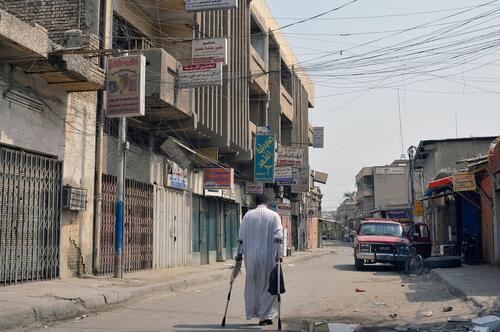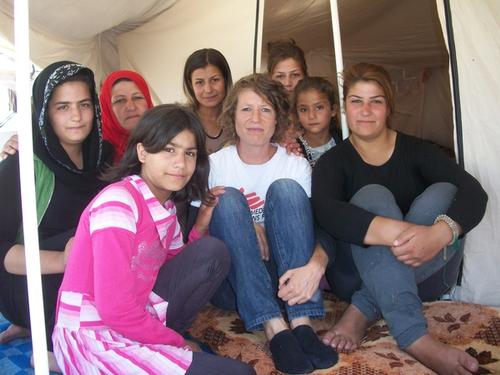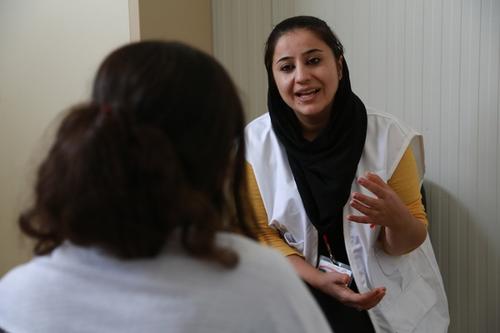Decades of conflict, political instability and social upheaval have left many Iraqis vulnerable to psychological stress, mental health disorders and in need of mental health care says MSF in a new report launched in Baghdad today.
Baghdad - Decades of conflict, political instability and social upheaval have left many Iraqis vulnerable to psychological stress, mental health disorders and in need of mental healthcare, says Médicins Sans Frontières (MSF) in a new report launched in Baghdad today.
MSF’s new report, Healing Iraqis: The Challenges of Providing Mental Healthcare in Iraq, records examples of the impact constant day to day violence have had on many Iraqi men, women and children, and describes the development, together with the Ministry of Health, of a programme to provide counselling care.
The international medical humanitarian organisation says there is an urgent need to scale up mental healthcare services in the country. MSF calls on the Iraqi Ministry of Health, and those who support them, to improve the quality and access to mental health services by integrating counselling in to existing health facilities across Iraq.
MSF also notes that more must be done to reduce the stigma of mental health to encourage people to come forward for counselling.
Since 2009 MSF has been working in Iraq providing mental health counselling to men, women and children in conjunction with the Iraqi Ministry of Health. MSF’s programmes focus on non-pharmaceutical approaches to address anxiety and depressive disorders commonly experienced by those exposed to violence and uncertainty.
“Many Iraqis have been pushed to their absolute limit as decades of conflict and instability has wreaked devastation. Mentally exhausted by their experiences, many struggle to understand what is happening to them. The feelings of isolation and hopelessness are compounded by the taboo associated with mental health issues and the lack of mental healthcare services that people can turn to for help,” says Helen O’Neill, MSF’s head of mission in Iraq.
Over the past four years MSF and the Iraqi Ministry of Health have introduced psychological counselling services in two hospitals in Baghdad and one in Fallujah. There are plans to use this as a model of care that can be replicated in other healthcare facilities across the country with the Ministry of Health starting new units in Kut, Karbala and Sulaymaniyah Hospitals. MSF’s also recommends the Iraqi health system to integrate psychological counselling into community based basic healthcare services to increase access, particularly to women and children.
According to patient data collected in 2012 by MSF and the Ministry of Health in Iraq, 97 per cent of people who received counselling reported clinically significant psychological symptoms at admission. When measured on the last visit, this figure had reduced to 29 per cent.
Even excluding domestic conflict, almost half of all cases seen in the programme (48 per cent) were violence-related. Nearly all staff and patients in the mental health programme have either experienced or know someone near to them who has been directly impacted by a violent event over the past years.
The report carries testimony from Iraqis traumatised and struggling to rebuild lives after witnessing extreme violence.
A 36-year-old widowed mother of three describes how she started counselling sessions after her life has been turned upside down two years ago, when her husband was killed
“I started attending the mental health counselling sessions when I felt I’m so tired and very sad. I felt I had a psychological problem and that made me disturbed because I’m unable to cope well with others. I lost my husband two years ago and the incident affected my life. It changed my life, it turned my life upside down. I’m now the only one left responsible for raising my kids.”
A 10-year-old child describes how counselling has helped her improve her speech:
“I started attending the sessions to help improve my speech and help me overcome my fear. I’m scared of everything. My body is always shivering. I can’t spell words correctly anymore. My teacher and my fellow classmates beat me all the time in school. I can’t study or learn anything. I’m unable to concentrate. I don’t talk to anyone. This is the first time I’ve talked to anyone about my problems.”
Providing care for such traumatic experience is not easy, but the counselling model has proven to be beneficial in helping people regain a level of dignity and control of their lives.
Configure





